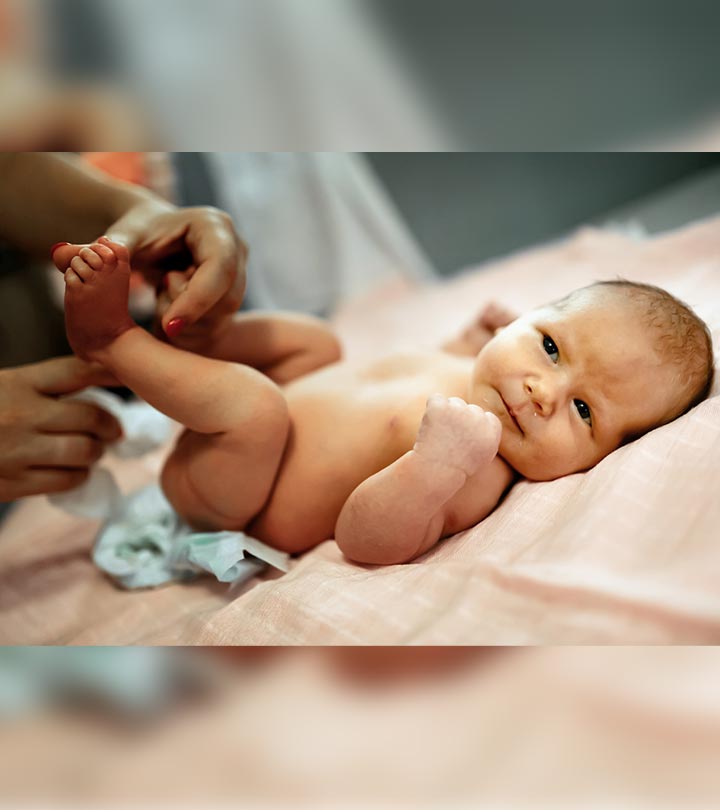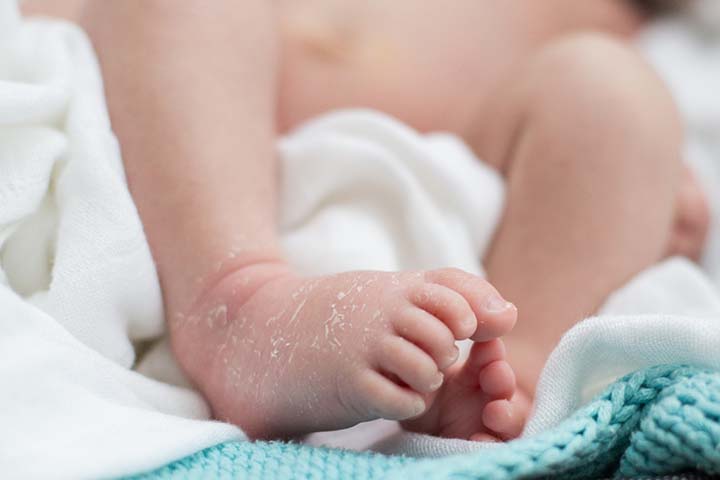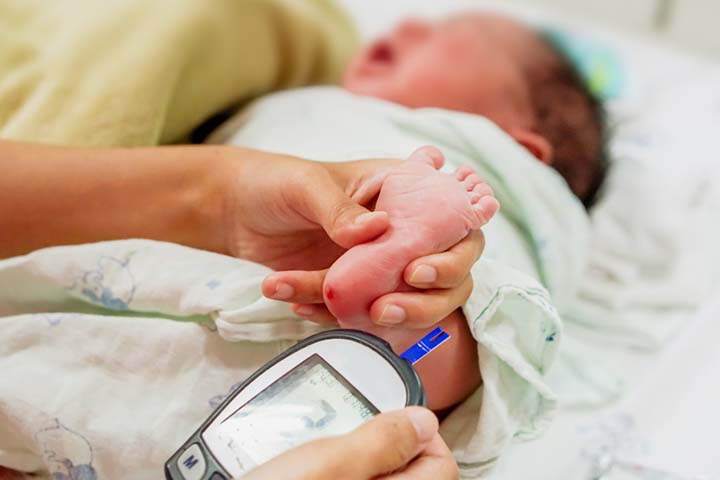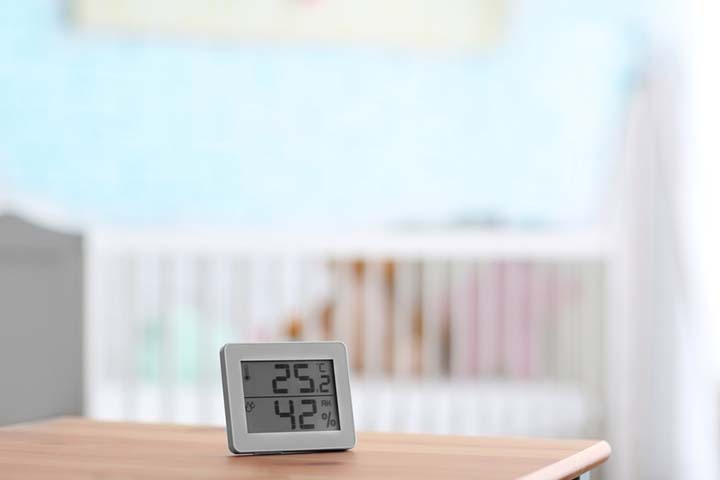Urate crystals in newborn diaper may indicate reddish, orange, or pinkish residue in urine, almost similar to brick-red dust or pinkish stain in the diaper. Because of diaper discoloration associated with urate crystals, parents often assume it to be bloody urine. Urate is a salt made up of uric acid, a weak organic acid produced in the body as a byproduct of the metabolism of some endogenous chemicals (1).
While urate crystals in your baby’s urine are common in the first few days after birth, their presence over an extended period could be a cause for concern. Read on as we discuss the different causes of urate crystals in babies and ways to prevent them.
What Causes Urate Crystals In An Infant’s Diaper?
A baby may excrete urate crystals due to the high concentration of uric acid in the blood. Uric acid is a waste product synthesized in the liver, intestines, and certain cells of the circulatory system when the body breaks down purines (2)(3). Purines are compounds formed during the natural processing of food compounds and compounds released due to natural cell death (4).
Uric acid enters the blood and reaches the kidneys. The kidneys filter uric acid, which dissolves with other compounds found in urine to form uric acid salts called urates. Excess uric acid leads to more urate formation. Excess urate is excreted through urine and is visible as urate crystals in the baby’s diaper contents.
The following conditions and scenarios could lead to excess uric acid concentration (hyperuricemia) in the blood, leading to urate crystals in the baby’s diapers.
1. Dehydration
Breast milk (or less ideal, an infant formula), is the only food for a newborn for the first six months of their lives. Babies get all their nutrition and fluids from breast milk. Inadequate ingestion of breast milk could increase the risk of dehydration, which may concentrate the newborn’s urine, increasing the risk of urate crystals in the urine (5).
Breastfeeding issues, such as inadequate breast milk supply, are usually a leading reason for dehydration among babies. However, a baby may become dehydrated for several other reasons, such as vomiting due to illness and even prolonged nursing strikes. You may read more about the causes of dehydration in babies here.
2. Kidney diseases
Kidney diseases, such as chronic kidney disease (CKD)iXLongstanding kidney diseases that may lead to damage and loss of kidney function., could affect the kidneys’ functions, making them less efficient at filtering blood. It could lead to the accumulation of urate crystals in the kidneys, causing kidney stones (6). Urate crystals from the kidneys may reach parts of the urinary tract and also pass through the urine.
Several types of kidney diseases exist, and babies may usually experience congenital kidney problems, such as those due to genetic disorders (7).CKD is usually the most common risk factor for hyperuricemia, excess uric acid in the blood, increasing the risk of urate crystals in baby’s diapers(8).
3. Underlying problems and other factors
Several other problems and conditions may lead to excess uric acid in blood and urate crystals in the urine. These conditions may usually be rare in infants(9).
- Acidosis (excess acid in the blood)
- Diabetes
- HypoparathyroidismiXA condition characterized by insufficient production of parathyroid hormones that are responsible for calcium and phosphorous levels.
- Chronic illnesses, such as leukemia
- Maternal illnesses during pregnancy, such as preeclampsia
- Side effects of certain medicines
Several factors may cause these conditions, and various factors may cause these conditions to lead to hyperuricemia. Therefore, do speak to the baby’s healthcare provider if you have any concerns about urate crystals due to illness in babies.
How Long Do Urate Crystals Last In Babies?
Studies suggest that about 22% of newborns show urate crystals in their diapers for the first one week of their life (10). Urate crystals in newborns usually resolve in days as the breast milk supply stabilizes and the baby feeds well.
If your baby has reddish residue of urate crystals in their diapers for more than a week, consult a doctor. You must also see a doctor if your baby is unwell or was diagnosed with a congenital problem at birth.
Christina Connors, a mother of one, says about the time she observed dark orange coloring in her 5-month-old baby’s diaper. Sharing her experience, she says, As I changed his first two diapers of the day, I noticed some dark orange coloring. I didn’t think it was blood and wasn’t too concerned with the first diaper, but when it was in his second diaper, I started thinking that red blood mixed with yellow pee could possibly be causing this orange coloring. I called a local urgent care, and they said that this was too serious of a condition for them to handle, especially him being 5 months, and said that they would not take him but advised me to take him in immediately to Emanuel Children’s Hospital. I also called and left a message with his Pediatrician’s office, and the on-call nurse advised me as well to take him in right away to Emanuel. She mentioned that when blood is present in urine, it can be a sign of a kidney infection, which can be serious for a child so young. So…off to Emanuel, we went. Dale was at work, but he met us there shortly. We were there for over 6 hours, but Everett was a happy camper the whole time.
The doctors performed a urinalysis. Sharing about the findings of the test, Connors shares, “After a urinalysis, the orange coloring in his diaper was the result of urate crystals/highly concentrated urine due to dehydration. The doctor said that this isn’t uncommon and sent us home relieved (i).”
What Foods Can Cause Urate Crystals?
Uric acid is also produced due to the breakdown of purinesiXChemical compounds in food responsible for the occurrence of gout.found in food items (3). Urate crystals due to intake of excess purine-rich food items are not seen in babies younger than six months since they are exclusively breastfed.
The intake of excess purine-rich food items by babies older than six months may increase the risk of urate crystals. The following are food items with high purine content (11)(12).
- Red meat
- Organ meat, such as liver
- Certain types of seafood, such as salmons, sardines, anchovies, shrimps, and lobsters
- Dried beans
- Foods and beverages rich in high fructose corn syrup
The occasional overeating of these foods seldom causes urate crystals in healthy babies. Urate crystals due to a high purine diet may occur if the baby’s solid food diet is consistently imbalanced for several weeks to months, causing other problems, such as malnutrition, as well.
Neonates with existing kidney or liver problems and genetic disorders may be more likely to develop urate crystals due to purine-rich foods. An example is the Lesch-Nyhan syndrome, a rare genetic disorder that causes deficiency of an enzyme vital for processing purine. The absence of the enzyme affects the body’s biochemical pathways for processing purine. It leads to excess uric acid in the blood and increased chances of urate crystals due to a high purine diet (13).
How To Prevent Urate Crystals In Newborns?
Urate or uric acid crystals during the first week of life are normal and seldom a cause for concern. Nevertheless, the following measures may help reduce the risk of the baby excreting urate crystals.
- Ensure adequate breastfeeding. Make sure you breastfeed your baby soon after birth and keep breastfeeding on demand. According to the NHS, UK, you cannot overfeed a breastfed baby (14). Your baby will feed as much they need. Therefore, do not worry if they demand a feed several times across day and night. Adequate breastfeeding can prevent dehydration since breast milk is the only source of fluids for your little one for the first six months.
- Provide the baby a well-balanced diet. Babies older than six months should be provided a diet containing food items in the right quantities. It will ensure they receive all nutrients and not just food items with excess purine. If your baby has Lesch-Nyhan syndrome or any other disorder requiring a special diet, consult a certified pediatric dietician.
- Prevent factors that may cause dehydration. Dehydration may occur due to other factors, such as high humidity, high ambient temperature, and poor ventilation in the baby’s room. Babies tend to get overheated and dehydrated quickly (15). Therefore, it is essential to maintain the right room temperature in the baby’s room. You may read more about maintaining the right room temperature for babies here.
Urate crystals in newborns’ diapers are common in the first few weeks after birth. These crystals usually disappear within a week or two after birth as the baby starts feeding enough, and the breastmilk supply becomes stable. If these crystals continue to appear even after a few weeks, you should check with your baby’s medical professional or pediatrician and discuss the possible treatment measures. Ensure that your baby is adequately hydrated and has nutritious food to reduce the occurrence of these crystals.
Key Pointers
- Newborns can have urate crystals in their diapers during the first week after birth and seldom cause concern.
- Urate crystals form due to the excess of uric acid (hyperuricemia) in the body.
- Dehydration and chronic kidney diseases are the primary causes of urate crystals.
- Keeping the baby optimally hydrated and a well-balanced diet for babies above six months could reduce the risk of urate crystals.















